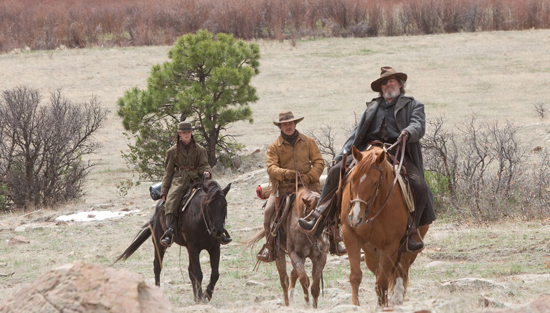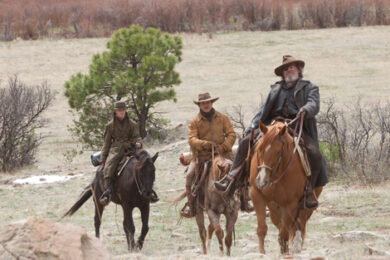When Graham Greene talked about his writing, he divided his work into two categories. ‘Novels,’ such as The Power and the Glory, were intended as more serious literary efforts, upon which he felt his reputation as a great author would be based. ‘Entertainments,’ such as The Ministry of Fear, were generally thrillers or suspense stories, designed to appeal to a wider public, but which also often contained a notable philosophical edge. It would not be difficult to draw a similar distinction in the Coen brothers’ oeuvre. For every Fargo, A Serious Man or No Country For Old Men, there is a The Big Lebowski, Burn After Reading or, now, True Grit. They are perhaps seen as Hollywood’s most serious working filmmakers, but a quick look at their filmography shows the brothers Coen are not afraid of making a film purely as entertainment.
True Grit is a shining example of this: it features the sweeping vistas that appeared in No Country For Old Men, the oddball vignettes that have become synonymous with the Coens’ work, and a triumvirate of great performances. But above all it is a lot of fun. The film’s mischievous sense of humour seems to have been reflected in the atmosphere on set: both Hailee Steinfeld and Jeff Bridges were full of in-jokes and wry smiles when The Quietus caught up with them in Claridge’s Mayfair. The startlingly young Steinfeld (14) clearly learnt a lot from the venerable veteran Bridges. She believes her youth, in addition to some great guidance, helped bring out what it is an arrestingly assured performance: "I feel that [my age] is where the similarities come in with the character … Other than doing a scene with Jeff Bridges, which was pretty amazing in itself … I was very nervous on the plane ride there, and thought it would be quite intimidating. But the minute I met Jeff and the other actors and the Coen brothers and just, you know, realising that they’re just there to do a job and so am I. That really made me feel at ease."
It perhaps seems only natural for Bridges to slot into the father role Rooster himself grows into throughout film, taking the starlet under his wing, and to some extent this is what happened: "Having three daughters myself, it was very difficult not to fall into that father relationship with Hailee. What’s doubly interesting is that I have a Hayley myself, one of my daughters is called Hayley as well, spelled differently, but, you know, the same. But one of the terrific things about Hailee is that she is not only a great actor, but she really appreciates being fourteen. She’s not one of those people whose chomping to be 35, and that, to a great degree, is due to her parents doing such a great job. They were on the set quite a bit and we had a great time together. I don’t know if you know the game, but we played ‘Pass the Pigs’. It’s one of my favourite games to play on the set. We all had different names: Hailee was Bo Bacon. I was the Pig Man."
Ms. Steinfeld elaborated: "I feel, overall, the whole experience was very surreal. But what I will never forget, the first day, was just the reaction shot after we were riding away. It was Jeff, Matt and myself [Bridges nods approvingly], and after the first take – there was no dialogue, nothing – you looked at me and you said ‘that was your first scene in your first feature film’ and that felt great." One gets the feeling that this is going to be a film Steinfeld looks back on fondly throughout what promises to be a great career. And thanks to Bridges she already has some mementos to remind her of it: after she finished the anecdote, Bridges added "and I took your picture too, so you’ve got that to remember it."
True Grit is indeed a memorable movie. The Coens have taken great pains to emphasise that their film goes back to Charles Portis’s novel rather than the 1969 film staring John Wayne. Some might ask if we need another version of True Grit, but there are several reasons why the Coens’ movie comes out on top if the two are viewed together. Firstly, the Mattie Ross character is played as the tender 14 year old described in the novel: Kim Darby was 22 at the time of filming the original, and it shows. Secondly, the modern version infuses the blackly comic tone present in the novel with some hard-nosed scenes of violence – the trail-mates come across a mouldering corpse swinging from a tree, a villain gets shot in the face, while another has his fingers chopped off. The combination of an innocently delicate youth (who is actually a youth) with an uncompromising representation of violence creates a movie with a far more complex and subtle moral compass than the Henry Hathaway original. But it is perhaps the elevation of La Boeuf from minor to major character, as it is in the book, and Matt Damon’s excellent portrayal of the Texan dandy, that lifts this film head and shoulders above the 1969 effort.
This will be a relief to Bridges, who was mildly concerned about stepping into Wayne’s considerable size nines: "One of the first things that the Coen brothers told me was that they weren’t doing a remake of the movie True Grit, they were making a movie of the book by Charles Portis, with no reference to the old movie, as if there was no other movie ever made on this book and that was a relief to me, because I didn’t want to jump into ‘The Duke’s’ boots. I could just approach it fresh, like I would any other role I would take on."
It was clearly, aside from the opportunity to be reunited with the directors who reenergised his career, the Rooster of the book that attracted Bridges to the role of the whisky swilling, eye patch wearing U.S. Marshal. "One of the things that I enjoyed, and this was really in the book, [is that] most Western characters in movies, like Rooster, are the strong silent Clint Eastwood type. And this guy was the antithesis of that, he’s verbose, almost a boor. He just talks: [becoming a fog horn] ‘Blah! Blah! Blah! Blah! Blah!’ About his life and his stories, and you’ve almost got the feel that he didn’t get the chance to do that too much, and he’s got a captive audience in this young girl, who he’s going to let know all about it. So, that was kind of intriguing and fun to explore."
The Coens are frequently described as taking a sideways glance at a genre, but this is not really what their True Grit is about. There are no particularly obvious allusions to or subversions of the Western’s generic conventions. Instead it focuses on an understated sincerity, a wry humour, and a nuanced visual style. If there is anyone making sideways glances in this film it is Reuben ‘Rooster’ Cogburn, hampered by his eye patch, running his gaze over the ferocious ‘injun’ territory. Bridges describes wearing the ocular garment as "…not too bad, you know, it messes with your depth perception a little bit, but then you just [tocks like a grandfather clock] flip it up like that every once in a while. Did I ever do a scene with you where I forgot to put it back down?", he asks Hailee.
"Yes!" she giggles in reply. The film’s warmth has clearly spilled over into this interview room.



